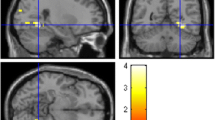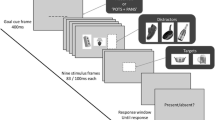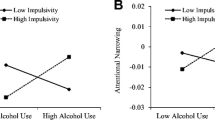Abstract
Background
Individuals with alcoholism are characterized by both attentional bias for alcohol cues and prepotent response inhibition deficit. We tested the hypothesis that alcoholics exhibit greater cognitive disinhibition when the response to be suppressed is associated with alcohol-related information.
Methods
Forty recently detoxified individuals with alcoholism were compared with 40 healthy non-substance abusers on the “Alcohol-Shifting Task”, a variant of the go/no-go paradigm requiring a motor response to targets and no response to distracters. The aim was to test the ability of alcoholics to discriminate between alcohol-related and neutral words. Sometimes, the alcohol-related words were the targets for the “go” response, with neutral words as distracters, sometimes the reverse. Several shifts in target type occurred during the task.
Results
Alcoholics made significantly more commission errors (i.e., press a key when a distracter displayed) and more omission errors (i.e., not press a key when a target displayed) than controls. Moreover, the number of commission errors was greater in alcoholics when alcohol-related stimuli had to be detected.
Conclusions
These results demonstrate that alcoholics exhibit a basic prepotent response inhibition deficit, which is enhanced when the response to be suppressed is related to alcohol. We discuss clinical and theoretical implications of these findings.



Similar content being viewed by others
References
American Psychiatric Association (1994) Diagnostic and statistical manual of mental disorders, 4th edn. American Psychiatric Association, Washington, DC
Bechara A, Dolan S, Denburg N, Hindes A, Anderson SW, Nathan PE (2001) Decision-making deficits, linked to a dysfunctional ventromedial prefrontal cortex, revealed in alcohol and stimulant abusers. Neuropsychologia 39:376–389
Beck AT (1987) Beck depression inventory. Psychological Corporation, San Antonio, Texas
Belleville S, Rouleau N, Caza N (1998) Effects of normal aging on the manipulation of information in working memory. Mem Cognit 26:572–583
Burgess PW, Shallice T (1996) Response suppression, initiation and strategy use following frontal lobe lesions. Neuropsychologia 34:263–272
Collette F, Van Der Linden M (2002) Brain imaging of the central executive component of working memory. Neurosci Biobehav Rev 26:105–125
Cox WM, Hogan LM, Kristian MR, Race JH (2002) Alcohol attentional bias as a predictor of alcohol abusers’ treatment outcome. Drug Alcohol Depend 68:237–243
Dao-Castellana MH, Samson Y, Legault F, Martinot JL, Aubin HJ, Crouzel C, Feldman L, Barrucand D, Rancurel G, Féline A, Syrota A (1998) Frontal dysfunction in neurologically normal chronic alcoholic subjects: metabolic and neuropsychological findings. Psychol Med 28:1039–1048
Field M, Mogg K, Zetteler J, Bradley BP (2004) Attention biases for alcohol cues in heavy and light social drinkers: the roles of initial orienting and maintained attention. Psychopharmacology 176:88–93
Goldstein RZ, Volkow ND (2002) Drug addiction and its underlying neurobiological basis: neuroimaging evidence for the involvement of the frontal cortex. Am J Psychiatr 159:1642–1652
Goudriaan AE, Oosterlaan J, de Beurs E, van den Brink W (2005) Decision making in pathological gambling: a comparison between pathological gamblers, alcohol dependents, persons with Tourette syndrome, and normal controls. Brain Res Cogn Brain Res 23:137–151
Goudriaan AE, Oosterlaan J, de Beurs E, van den Brink W (2006) Neurocognitive functions in pathological gambling: a comparison with alcohol dependence, Tourette syndrome and normal controls. Addiction 101:534–547
Habeych ME, Folan MM, Luna B, Tarter RE (2006) Impaired oculomotor response inhibition in children of alcoholics: the role of attention deficit hyperactivity disorder. Drug Alcohol Depend 15:11–17
Hildebrandt H, Brokate B, Eling P, Lanz M (2004) Response shifting and inhibition, but not working memory, are impaired after long-term heavy alcohol consumption. Neuropsychology 18:203–211
Hofland K, Johansson S (1982) Word frequencies in British and American English. The Norwegian Computing Centre for the Humanities NAVF, Bergen
Johnsen BH, Laberg JC, Cox WM, Vaksdal A, Hugdahl K (1994) Alcoholic subjects’ attentional bias in the processing of alcohol related words. Psychol Addict Behav 8:111–115
Jones BT, Jones BC, Smith H, Copley N (2003) A flicker paradigm for inducing change blindness reveals alcohol and cannabis information processing biases in social users. Addiction 98:235–244
Kamarajan C, Porjesz B, Jones K, Chorlian D, Padmanabhapillai A, Rangaswamy M, Stimus A, Begleiter H (2006) Event-related oscillations in offspring of alcoholics: neurocognitive disinhibition as a risk for alcoholism. Biol Psychiatry 59:625–34
Lezak MD (1995) Neuropsychological assessment, 3rd edn. Oxford University Press, New York
Lubman DI, Yücel M, Pantelis C (2004) Addiction, a condition of compulsive behaviour? Neuroimaging and neuropsychological evidence of inhibitory dysregulation. Addiction 99:1491–1502
Lusher J, Chandler C, Ball D (2004) Alcohol dependence and the alcohol Stroop paradigm: evidence and issues. Drug Alcohol Depend 75:225–231
Moselhy HF, Georgiou G, Kahn A (2001) Frontal lobe changes in alcoholism: a review of the literature. Alcohol Alcohol 16:357–368
Murphy FC, Sahakian BJ, Rubinsztein JS, Michael A, Rogers RD, Robbins TW, Paykel ES (1999) Emotional bias and inhibitory control processes in mania and depression. Psychol Med 29:1307–1321
Nigg JT (2000) On inhibition/disinhibition in developmental psychopathology: views from cognitive and personality psychology and a working inhibition taxonomy. Psychol Bull 126:220–246
Nigg JT, Wong MM, Martel MM, Jester JM, Puttler LI, Glass JM, Adams KM, Fitzgerald HE, Zucker RA (2006) Poor response inhibition as a predictor of problem drinking and illicit drug use in adolescents at risk for alcoholism and other substance use disorders. J Am Acad Child Adolesc Psychiatry 45:468–475
Noël X, Van der Linden M, Schmidt N, Sferrazza R, Hanak C, Le Bon O, Kornreich C, De Mol J, Pelc I, Verbanck P (2001) Supervisory attentional system in non-amnesic male alcoholic subjects. Arch Gen Psychiatry 58:1152–1158
Noël X, Sferrazza R, Van der Linden M, Paternot J, Verhas M, Hanak C, Pelc I, Verbanck P (2002) Contribution of frontal cerebral blood flow measured by (99 m)Tc-Bicisate spect and executive function deficits to predicting treatment outcome in alcohol-dependent patients. Alcohol Alcohol 37:347–354
Noël X, Van der Linden M, D’Acremont M, Colmant M, Hanak C, Pelc I, Verbanck P, Bechara A (2005) Cognitive biases toward alcohol related words and executive deficits in poly-substance abusers with alcoholism. Addiction 100:1302–1309
Noël X, Colmant M, Van der Linden M, Bechara A, Bullens Q, Hanak C, Verbanck P (2006) Time course of attention for alcohol cues: the role of initial orienting. Alcohol Clin Exp Res 30:1–8
Ratti MT, Bo P, Giardini A, Soragna D (2002) Chronic alcoholism and the frontal lobe: which executive functions are impaired? Acta Neurol Scand 105:276–281
Robinson TE, Berridge KC (1993) The neural basis of drug craving: an incentive-sensitization theory of addiction. Brains Res Rev 18:247–291
Robinson TE, Berridge K (2003) Addiction. Annu Rev Psychol 54:25–53
Schweinsburg AD, Paulus MP, Barlett VC, Killeen LA, Caldwell LC, Pulido C, Brown SA, Tapert SF (2004) An FMRI study of response inhibition in youths with a family history of alcoholism. Ann NY Acad Sci 1021:391–394
Sharma D, Albery IP, Cook C (2001) Selective attentional bias to alcohol related stimuli in problem drinkers and non-problem drinkers. Addiction 96:285–295
Spielberger CD, Gorsuch RL, Lushene R, Vagg PR, Jacobs GA (1993) Manuel de l’inventaire d’anxiété état-trait. Forme Y. Paris: Editions du Centre de Psychologie Appliquée (ECPA)
Stetter F, Ackerman K, Bizer A, Straube ER, Mann K (1995) Effects of disease-related cues in alcoholic inpatients: results of a controlled ‘Alcohol Stroop’ study. Alcohol Clin Exp Res 19:593–599
Stormark KM, Field NP, Hugdahl K, Horowitz M (1997) Selective processing of visual alcohol cues in abstinent alcoholics: an approach–avoidance conflict? Addict Behav 22:509–519
Tiffany ST (1990) A cognitive model of drug urges and drug-use behaviour: role of automatic and nonautomatic processes. Psychol Rev 97:147–168
Townshend JM, Duka T (2001) Attentional bias associated with alcohol cues: differences between heavy and occasional social drinkers. Psychopharmacology 157:67–74
Waters H, Green M (2003) A demonstration of attentional bias, using a novel dual task paradigm, towards clinically salient material in recovering alcohol abuse patients? Psychol Med 33:491–498
Acknowledgment
Thanks to Aline Ernster for her helpful assistance in collecting data.
Author information
Authors and Affiliations
Corresponding author
Rights and permissions
About this article
Cite this article
Noël, X., Van der Linden, M., d’Acremont, M. et al. Alcohol cues increase cognitive impulsivity in individuals with alcoholism. Psychopharmacology 192, 291–298 (2007). https://doi.org/10.1007/s00213-006-0695-6
Received:
Accepted:
Published:
Issue Date:
DOI: https://doi.org/10.1007/s00213-006-0695-6




